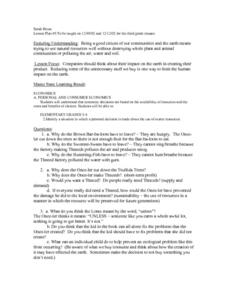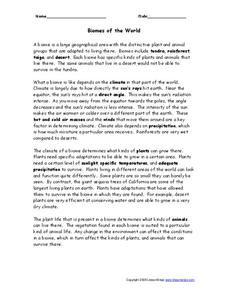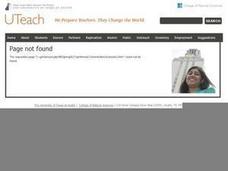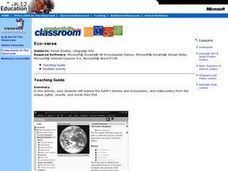Curated OER
A Cell Is Like A City
Students create analogies that help them remember the cell parts as well as their respective functions.
Curated OER
Children's Health
Students learn the basic parts of an insect, where they like to hide indoors, and how to safely get rid of them. They assemble the cockroach body and cut it out of a brown bag. They attach pipe cleaners as legs and attennae. They then...
Curated OER
Prairies
Students identify the basic characteristics of the prairie ecosystem, and several commonly known prairie species. They create a classroom mural of a prairie ecosystem; and create reports about what they have found out.
Curated OER
Economics -- Third Grade
Third graders read the Dr. Seuss book The Lorax. In groups, they answer questions that are related to economics and distribution of goods. They also identify the environmental issues present in the book and perform a skit in front of the...
Curated OER
Biomes of the World
In this biomes worksheet, learners read an article on biomes and answer 10 multiple choice, short answer or true and false questions relating to biomes.
Curated OER
Data Habitats
Learners develop data acquisition skills and quantify descriptive data. In this data lesson students divide into groups and do an activity that shows them why it is important to record data with accuracy and consistency.
Curated OER
Researching the Nutrient Cycle
In this researching the nutrient cycle worksheet, students read about the cycle of nutrients, look at the diagram, then answer two questions by doing research on this topic.
Curated OER
Producers, Consumers, and the Food Chain
Third graders discuss producers, consumers, and the food chain. In this producers and consumers activity, 3rd graders talk about organisms, the food chain, and the difference between producers and consumers. They complete review...
Curated OER
Different Types Of Bugs
First graders create their own bug that contain the different characteristics that a bug can have. In this bugs lesson plan, 1st graders first list 3 - 5 characteristics before they create their bug.
Curated OER
Endangered Species 1: Why Are Species Endangered?
Students are oriented to the plight of endangered species and to help them explain and gain perspective on human issues that continue to endanger species and threaten our global environment.
Curated OER
Food Webs
Students research what food is eaten by the following organisms: penguins leopard seals, krill, elephant seals, petrels, albatross, fur seals, squid, insects and grass. They make a food web using the data they have gathered.
Curated OER
Fatty Acids
Students draw connections between chemical structures of fats and oils (lipids) and their use in food science and nutrition.
Curated OER
Plants 'R' Us!
Students investigate the interdependencies of plants and animals, and study what a food web is. They create a food web using yarn and images.
Curated OER
Experimental Archaeology: Making Cordage
Students make a cordage and use an activity sheet to experience a skill that ancient Native American in North Carolina neded for everyday life.
Curated OER
Information Fluency Unit
Fourth graders, after defining the task and searching for some creative strategies, role play being a Park Ranger who tries to save Big Bend from being removed from the National Park system in Texas. They support the keeping of Big Bend...
Curated OER
Our Special Planet Earth
Students explore what is special about our planet. They explore the various climates that are found on the planet Earth. Students create an advertisement to convince people why their favorite environment would be the best place to visit.
Curated OER
Bird Beak Adaptation Lab
Middle schoolers investigate bird beaks to determine which physical adaptations are necessary based on the types of food the birds eat. They participate in a lab by visiting multiple stations to determine which beaks are most efficient,...
Curated OER
Living vs. Non-Living Things
Fourth graders describe the characteristics that determine if something is living, dead, or non-living. They determine the difference between living and non-living things. Students determine if an object is living or non-living and...
Curated OER
Combustion Reactions
Students write a balanced chemical reaction. They articulate how burning fossil fuels increase the carbon dioxide levels in the atmosphere. Students incorporate all the environmental risks involved as well.
Curated OER
Eco-Poetry
Students explore the Earth's various biomes and ecosystems using Internet research. They create a multimedia poem using the photos, sounds, and vocabulary from their research.
Curated OER
Water Cycle Boogie
Students explore the water cycle. They learn the "Water Cycle Boogie." Students create hats to represent the different parts of the cycle and learn hand motions to go with the words of the song. Students practice singing the song and the...
Curated OER
Everything's Connected
Students explore how trash decomposes. In this ecosystem lesson, students discuss new vocabulary words, such as producers and consumers, and think critically to answer how landfills work.
Curated OER
What Does Life Look Like Under a Microscope?
Students discover cells make up all living things. In this life science lesson, students investigate living organisms and the cells that create them. Finally the students create a testable question, conduct an investigation, and draw...
Curated OER
Water Quality Survey
Students identify the differences in the water quality of a stream and complete water testing. In this water quality lesson students collect aquatic insects and identify them.

























